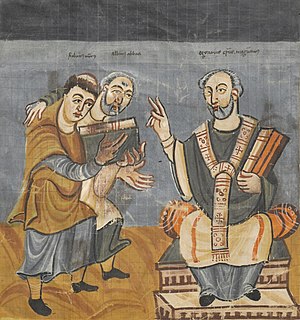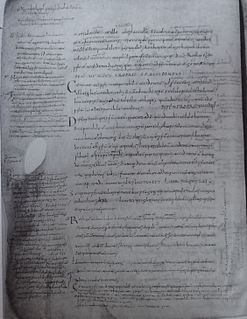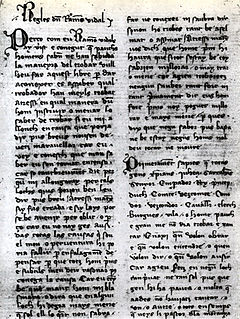 W
WÆthelstan A is the name given by historians to an unknown scribe who drafted charters, by which the king made grants of land, for King Æthelstan of England between 928 and 935. They are an important source for historians as they provide far more information than other charters of the period, showing the date and place of the grant, and having an unusually long list of witnesses, including Welsh kings and occasionally kings of Scotland and Strathclyde.
 W
WAlcuin of York – also called Ealhwine, Alhwin, or Alchoin – was an English scholar, clergyman, poet, and teacher from York, Northumbria. He was born around 735 and became the student of Archbishop Ecgbert at York. At the invitation of Charlemagne, he became a leading scholar and teacher at the Carolingian court, where he remained a figure in the 780s and 790s. "The most learned man anywhere to be found", according to Einhard's Life of Charlemagne, he is considered among the most important intellectual architects of the Carolingian Renaissance. Among his pupils were many of the dominant intellectuals of the Carolingian era.
 W
WGerard of Cremona was an Italian translator of scientific books from Arabic into Latin. He worked in Toledo, Kingdom of Castile and obtained the Arabic books in the libraries at Toledo. Some of the books had been originally written in Greek and, although well known in Byzantine Constantinople and Greece at the time, were unavailable in Greek or Latin in Western Europe. Gerard of Cremona is the most important translator among the Toledo School of Translators who invigorated Western medieval Europe in the twelfth century by transmitting the Arabs' and ancient Greeks' knowledge in astronomy, medicine and other sciences, by making the knowledge available in Latin. One of Gerard's most famous translations is of Ptolemy's Almagest from Arabic texts found in Toledo.
 W
WIsrael the Grammarian was one of the leading European scholars of the mid-tenth century. In the 930s, he was at the court of King Æthelstan of England (r. 924–39). After Æthelstan's death, Israel successfully sought the patronage of Archbishop Rotbert of Trier and became tutor to Bruno, later the Archbishop of Cologne. In the late 940s Israel is recorded as a bishop, and at the end of his life he was a monk at the Benedictine monastery of Saint-Maximin in Trier.
 W
WMahmud ibn Hussayn ibn Muhammed al-Kashgari was an 11th-century Kara-Khanid scholar and lexicographer of the Turkic languages from Kashgar.
 W
WNotker Labeo, also known as Notker the German or Notker III, was a Benedictine monk and the first commentator on Aristotle active in the Middle Ages. "Labeo" means "the thick-lipped one". Later he was named Teutonicus in recognition of his services to the German language.
 W
WSaint Paulinus II was a priest, theologian, poet, and one of the most eminent scholars of the Carolingian Renaissance. From 787 to his death, he was the Patriarch of Aquileia. He participated in a number of synods which opposed Spanish Adoptionism and promoted both reforms and the adoption of the Filioque into the Nicene Creed. In addition, Paulinus arranged for the peaceful Christianisation of the Avars and the alpine Slavs in the territory of the Aquileian patriarchate. For this, he is also known as the apostle of the Slovenes.
 W
WRabanus Maurus Magnentius, also known as Hrabanus or Rhabanus, was a Frankish Benedictine monk, theologian, poet, encyclopedist and military writer who became archbishop of Mainz in East Francia. He was the author of the encyclopaedia De rerum naturis. He also wrote treatises on education and grammar and commentaries on the Bible. He was one of the most prominent teachers and writers of the Carolingian age, and was called "Praeceptor Germaniae", or "the teacher of Germany". In the most recent edition of the Roman Martyrology, his feast is given as 4 February and he is qualified as a Saint ('sanctus').
 W
WSibawayh, whose full name is Abu Bishr Amr ibn Uthman ibn Qanbar al-Basri, was a Persian leading grammarian of Basra and author of the earliest book on Arabic grammar and linguistics. His famous unnamed work, referred to as Al-Kitāb, or "The Book", is a five-volume seminal discussion of the Arabic language.
 W
WTatwine was the tenth Archbishop of Canterbury from 731 to 734. Prior to becoming archbishop, he was a monk and abbot of a Benedictine monastery. Besides his ecclesiastical career, Tatwine was a writer, and riddles he composed survive. Another work he composed was on the grammar of the Latin language, which was aimed at advanced students of that language. He was subsequently considered a saint.
 W
WRaimon Vidal de Bezaudu(n) was a Catalan troubadour from Besalù. He is notable for authoring the first tract in a Romance language (Occitan) on the subject of grammar and poetry, the Razós de trobar, a title which translates as "Reasons of troubadour composition". He began his career as a joglar and he spent his formative years at the court of Hug de Mataplana, which he often recalls fondly in his poems and songs.